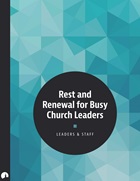When I wake up in the morning, as a general rule, my temperature is 98.6. I expect this. I feel more or less entitled to it. If it's not the case, I figure something is going wrong, and I want it fixed.
What about my spiritual temperature?
Should I expect it to be as well-regulated? After all, the apostle Paul said, "Never be lacking in zeal, but keep your spiritual fervor, serving the Lord." If I'm lacking, has somebody (me? my wife? my church? God?) messed up?
On the other hand, the same Paul said, "I face daily the pressure" of concern for all the churches. "Who is weak, and I do not feel weak?"
How do we reconcile fervor and weakness?
The psalmist says that the godly person is "like a tree planted by streams of water that yields fruit in season, whose leaf does not wither, who consistently prospers." But a few psalms later we hear: "My bones are in agony. My soul is in anguish. How long, O Lord, how long? … I am worn out from groaning; all night long I flood my bed with weeping and drench my couch with tears" (Ps. 6).
Every Christian wants a "normal" reading on their spiritual thermometer. We all want to feel spiritually vigorous, and we hurt when we don't. This pain is intensified for people who lead church ministries. You ask yourself the questions: "How am I to lead people to life when I feel dead inside? Is it even safe to try?"
How can we make sense of, and respond to, our fluctuating spiritual temperatures? Are we alone in this experience? And what does prayer look like during these times?
Nobody's Soul But Mine?
There is an old saying: "We tend to compare our insides with other people's outsides." Nowhere is this truer than in ministry. I see other ducks floating serenely on their ministry ponds, but the only furiously churning legs I'm aware of are my own.
Perhaps it's helpful to know how common soul struggles are. Consider the story of Agnes.
From the time she was a young girl, Agnes believed. Not just believed: she was on fire. She wanted to do great things for God. She said things such as she wanted to "love Jesus as he has never been loved before."
Agnes had an undeniable calling. She wrote in her journal that "my soul at present is in perfect peace and joy." She experienced a union with God that was so deep and so continual that it was to her a rapture. She left her home. She became a missionary. She gave him everything.
And then he left her.
At least that's how it felt to her. "Where is my faith?" She asked. "Deep down there is nothing but emptiness and darkness …. My God, how painful is this unknown pain … I have no faith."
She struggled to pray: "I utter words of community prayers—and try my utmost to get out of every word the sweetness it has to give. But my prayer of union is not there any longer. I no longer pray."
She still worked, still served, still smiled. But she spoke of that smile as her mask, "a cloak that covers everything."
This inner darkness continued on, year after year, with one brief respite, for nearly 50 years. God was just absent.
Such was the secret pain of Agnes, who is better known as Mother Teresa.
Mother Teresa wrote letters (intended only for her spiritual directors) on the torment of her soul. After her death, the process of canonization made these public. They were published to much astonishment (Come Be My Light, ed. by Brian Kolodiejchuk, Doubleday, 2007).
How are we to understand Agnes's story? In the midst of what seems like the perfection of Christian service, how could God abandon her to such spiritual desolation?
For starters, it should warn us about easy formulas. One old saying goes, "If you don't feel close to God anymore—guess who moved." But I wouldn't want to have asked that of Mother Teresa.
She never overcame her pain over God's silence. In a strange way, it became a part of her. In the midst of this struggle, a wise spiritual counselor told her three things she needed to hear.
First, that there was no human remedy for this darkness. (So she could not control it.)
Second, that "feeling" the presence of Jesus was not the only or even the primary evidence of his presence. (Jesus himself said that by their fruit—not their feelings—you shall know his true followers.) In fact, the very craving for God was a "sure sign" that God was present—though in a hidden way—in her life.
Third, that the pain she was going through could be redemptive. That Jesus himself had to experience the agony of the Absence of God: "My God, my God, why have you forsaken me?" His suffering redeemed us. Like him, Mother Teresa could suffer redemptively by clinging to God in the midst of darkness.
Am I a "Spiritual Glutton?"
Mother Teresa's story highlights the difficulty of defining spiritual vitality. It feels like Augustine's definition of time: as long as no one asks me what it is, I know what it is. How can we define being fully alive spiritually?
Paul calls the Holy Spirit "the Spirit of Life." From Genesis the Spirit is the one who animates and energizes human beings. So in the times when I am most energized to do ministry: when I am motivated to pray, when sermons come easily and preaching is a joy, when sin looks bad and my "360 evaluations" look good—then I feel spiritually vital.
But this is not the ultimate test.
I'm learning to distinguish spiritual vitality from simply being in a good mood. The danger for most of us is that we desire a particular state of being (feeling good) more than we desire God.
Notre Dame sociologist Christian Smith says the fastest-growing religion in America today is neither Christianity, Islam, nor some eastern religion. It is what he calls Moralistic Therapeutic Deism (MTD). In MTD, the most important "truth" about God is that he wants us all to be nice, to feel happy, and to be delivered from pain (that's the therapeutic part). Outside of being available when I need him, God will not interfere much with my life (there's the deism).
We are drawn to MTD because we want our life to be nice, happy, and uninterrupted. Smith says that MTD is in our culture—including our churches—like fluoride is in our water.
John of the Cross spoke about something like this condition. He called it "spiritual gluttony," a condition where God is merely a means to fulfill my desire to experience warm feelings and spiritual energy. John saw this as a temptation to all Christians, and taught that God will actually withdraw good feelings from us to help us grow. The "dark night of the soul"—which has come to be used by many people for any experience of suffering—actually has a very focused meaning for John. It is the season in which God withdraws comfort and emotional ease for a purpose which is good, but which we may not understand.
The Little Way
True spiritual vitality, then, is not primarily my subjective experience. It's not about "feeling spiritual."
It is being made alive by the Spirit. And only God can judge the extent to which that is actually happening from one moment to the next: "The wind blows wherever it will," said Jesus. "So it is with everyone born of the Spirit."
Mother Teresa's namesake, Saint Therese of Lisieux, was another follower of Jesus who knew about this. According to one biographer, she "lived for most of her adult life in utter darkness and dryness and abandonment by her divine Love." Her teaching of "the little way" has helped millions of Christians make sense of the dryness. Her "little way" is this: love. This is more important than "spiritual vitality."
Love.
No matter what darkness you find yourself in, choose as your guidepost a love for whoever God has cross your path.
That elder. That staff person. That attendee. That neighbor. Do not ask for more fascinating and important people to be part of your church. Just start by loving whomever is there.
You cannot see God, Theresa reasoned. But you can see your neighbor: that difficult, tedious, cranky person who grates on the only nerve you have left.
Love that one.
Prayers Fully Present
Lots of pastors feel guilty about prayer during spiritually dry times. We feel like we ought to pray, but we don't feel like we're connecting, and we don't want to "just go through the motions."
So let's try a question: Do you think Jesus prayed a lot because he wanted to pray, or because he thought he should pray?
I think he wanted to pray. To pray much, or deeply, prayer needs to move from the "should" category to the "want" category. That won't happen if I just tell myself I've got to pray more. How can you begin to pray in a way that will help you to want to pray?
Frustrated at my own lack of prayer, I found someone who had much wisdom and training in this. Kind of a remedial prayer coach. She advised me to spend a few moments after praying just jotting down what had gone on while I was praying. The most frequent observation I made was that while praying, I was aware of being very tired.
"Did you tell the Lord about this?" she asked.
No.
"Do you think it would be a good idea to talk to him about this?"
Yes.
I began to learn that though I was trying to set aside time to pray, I had a hard time being fully present. We all know what it is to be with another person when their mind is a million miles away. I began to think that's how God felt when I was praying.
After a period of frustration, my prayer coach had a suggestion: "For the next week, don't pray. Instead, take 30 minutes each day, and go do something you love to do. Something that makes you feel alive. And invite Jesus to do it with you."
Does that count?
So the next day I went to the ocean, took my shoes off, started to run, and invited Jesus to come along. And I found the strangest thing. When I thought I was supposed to be talking to him I found it effortful and difficult. Now that all I had to do was invite him, I couldn't stop thinking about him. I found myself effortlessly talking with him about ideas for sermon series, about concerns over my children, about needs of my church, about conflicts in the staff, about dreams for the future. And sometimes I just found myself wanting to point out the pelicans and the waves to him.
This was the beginning of walking prayer. Often I find my mind works better in prayer when my body is moving than when my body is still.
Often my wife and I walk a few miles around our house. It takes about an hour. There is one very steep hill on this journey that I usually run up. It takes two minutes and twenty seconds on a good day, and when I get to the top, my heart is beating as fast as hummingbird wings.
Not long ago, as I was running up the hill I was seized by the thought that I couldn't make it this time. Desperate, I began to repeat: "I can do all things through him who strengthens me." Just that, one step at a time, to the top. I was facing a conflicted situation in ministry at the time that required more wisdom and courage than I could muster. At the top of the hill the thought came: Just as I received the power to go up the hill, I will receive the power to face the conflict. And the flow of the Spirit came in a running prayer.
Ee-mouse Prayers
Writer Douglas Steere used to go on retreats led by a German retreat master with a thick Prussian accent. He would send the men out to pray on what sounded to Douglas like ee-mouse walks. For some time Douglas wondered what in the world an ee-mouse walk could be. Until he realized that the old teacher was sending them on Emmaus walks. It was a reference to the story in Luke, where two disciples were walking on the road to Emmaus when Jesus came into their midst, and Jesus joined the conversation without them recognizing him at first. Afterward they said to themselves, "Were not our hearts burning within us?" Sometimes the heartburn comes on an ee-mouse walk.
We can look for cues to ask God to energize us in our regular lives. In the Bible we are commanded to practice hospitality, to make space in our lives for others. Of course, it usually no longer involves giving lodging as in Jesus's day. But often the phone will ring. It may feel like an interruption. (Of course, if you're an extrovert, you may love interruptions.) Out of sheer habit I may find myself answering with a grudging spirit. What do you want? Make it fast. You're bothering me. This does not help me feel like a pastor.
But there is another way. Wil Derske is a Benedictine monk; one of the guidelines of their community is "Let all guests who arrive be received like Christ, for he is going to say, 'I came as a guest, and you received me.'" This has many applications. He writes that to accept a phone call is a chance to receive a guest. We can pause a moment before answering to change our inner attitude from irritation to welcome. Derske says he will say a prayer of blessing just before taking the call: Benedicamus Domino—it might be the Lord!
Often I pray while I'm looking at people. Ancient people did not usually close their eyes to pray. A friend of mine who knows church history said having people close their eyes to pray did not become common practice until the 1800s, and then it was mostly to get children to settle down in Sunday school.
Another cue comes from the Scriptures, an invitation to pray what might be called "paper prayers." Hezekiah was king of Israel when he received a letter from the much more powerful king of Assyria. The Assyrian king demanded the capitulation of Israel. He warned Hezekiah not to trust in God. He reminded Hezekiah of all the other nations that had trusted their gods—Gozan, Haran, Resephn, Hamath, Arpad, Sepharvain, Hena, Ivvah—all had been wiped out. He warned that resistance meant they would have to "eat their own filth and drink their own urine" before they died.
We're told that Hezekiah received the letter, read it. Then he went up to the temple "and spread it out before the Lord." And then he prayed, beginning by remembering whom he was addressing: "O Lord Almighty, God of Israel, enthroned between the cherubim, you alone are God over all the kingdoms of the earth. You have made heaven and earth. Give ear, O Lord, and hear; open your eyes, O Lord, and see" (Isa. 37:14-17).
So sometimes I do paper prayers. Sometimes I spread out words that I have written in a journal. Sometimes it's a bill. Sometimes it's an email that felt like a stab in the back. Sometimes it's a note from somebody I love.
The Ongoing Experiment
Often the question behind the issue of spiritual vitality is something like this: What's a reasonable expectation level for joy and spiritual enthusiasm for a person such as me? Or, perhaps in more difficult days: How little inner spiritual vitality can I muster without having to feel guilty?
I don't know.
That's one of those questions the Bible doesn't answer, like "How little can I believe and still get to heaven?" or "Where did Cain and Abel find their wives?"
Maybe there's a good reason it's left open-ended.
Frank Laubach is one of the great teachers about spiritual vitality. At a moment of great discouragement, he found himself the recipient of an invitation to make his life an adventure with God. He resolved to make the rest of his life an experiment to see how much he could feel each moment with active awareness of and submission to God's presence.
He asked: "Do you not understand that God is doing a great experiment with human lives? That is why there are so many of them. His question is: O child, how much will you let me fill this minute for you with the life that is Christ?"
That experiment is at the core of spiritual vitality.
John Ortberg is pastor of Menlo Park (California) Presbyterian Church and editor at large of Leadership Journal.
Copyright © 2011 by the author or Christianity Today/Leadership Journal.
Click here for reprint information on Leadership Journal.

Support Our Work
Subscribe to CT for less than $4.25/month
























